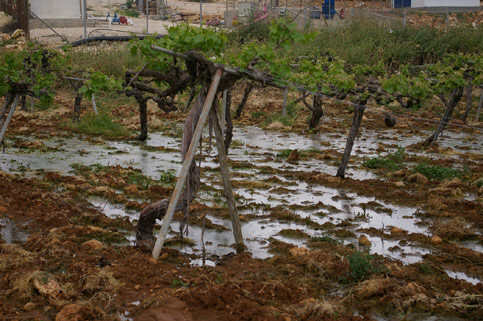The Electronic Intifada 28 April 2010

A vineyard in Beit Ummar village flooded with sewage from a nearby Israeli settlement. (Palestine Solidarity Project)
BEIT UMMAR, occupied West Bank (IPS) - Residents of this Palestinian village refuse to buy the idea that the flood of raw sewage from the adjacent Israeli settlement of Kfar Etzion, that destroyed vineyards and contaminated their drinking water, was an accident.
The Israeli Civil Administration, which administers the occupied West Bank, claims the spillage was the result of an accidental power malfunction which caused excess settlement sewage to overflow onto Palestinian land.
“This was no mistake,” said a British activist who has been documenting life in the village for several months. “The pipe was deliberately unscrewed by hand so that the sewage would spill over into Beit Ummar. That has nothing to do with an electricity cut,” he told IPS.
Villagers standing near a completely destroyed 70,000 square-meter vineyard belonging to the Sabarneh family said they believe it was a deliberate act of sabotage and part of a concerted campaign by the settlers to harass their Palestinian neighbors and vandalize their property.
Beit Ummar has been the target of a number of Israeli military raids at night last month. Activists who have been organizing nonviolent protests against the expropriation of their land for the settlements have been arrested and the village blockaded.
In a similar incident last week the Palestinian village of Bruqin, in the northern West Bank, was flooded with sewage from the nearby Ariel settlement, causing contamination of underground water and springs and damaging crops.
These incidents are part of a larger problem of scarce water resources where a Palestinian population of 2.5 million survives on 17 percent of the West Bank’s main underground aquifer.
The remaining water is channelled towards the West Bank’s (including East Jerusalem) 500,000 Israeli settlers, and into Israel proper.
The water shortage is compounded by the lack of wastewater treatment plants and inefficient treatment of waste and sewage in the Palestinian territory which fouls its water sources.
Israeli rights group B’Tselem released a study last year called “Foul Play: Neglect of wastewater treatment in the West Bank.”
According to the organization, more than 90 percent of Palestinian wastewater is not treated while only 20 percent of Palestinian homes, primarily in towns and cities, are connected to sewerage systems.
Furthermore, only 81 of 121 illegal Israeli settlements are connected to wastewater treatment facilities. More than half of the settlements’ treatment plants are too small to treat waste effectively and are ill-equipped to handle the burgeoning settler population.
The result is continual technical breakdowns and sewage overflow. Most of the settlements are situated on ridges and hilltops so sewage flows down towards the Palestinian villages and towns in the valleys below, contaminating their drinking water supplies and destroying their crops.
The Israeli settlers are not affected by this as they are connected to Israel’s water supply.
The planning and building authorities in the settlements and Israeli industrial areas also ignore Jordanian building and planning laws which govern how wastewater is to be treated in the West Bank.
The B’Tselem report further outlines the neglect of the territory’s water treatment plants by the Israeli Civil Administration during the decades of occupation and the current difficulties faced by Palestinian Authority (PA) water officials in trying to build new wastewater treatment plants or repair the old ones.
There is currently only one wastewater treatment plant operating in the West Bank in Ramallah. Three others have ceased to function and the PA has been unable to repair them or build new ones.
The West Bank is divided into Area A, which is under Palestinian control, Area B under joint Palestinian and Israeli control, and Area C which is under full Israeli control.
Area C comprises 60 percent of the West Bank. Areas A and B are mostly built up with little free land available.
However, in order to move around or build new wastewater treatment plants in Area C Palestinian officials from the PA Environment Authority require building permits from the Israeli Civil Administration.
B’Tselem and PA officials complain of the delays these officials face in getting building approval if they get them at all.
“There is an enormous amount of red tape and bureaucracy that Palestinian officials have to overcome before they get the permits,” says Eyal Hareuveni, the author of the B’Tselem report.
“The Israeli Civil Administration says that the Palestinians don’t provide the necessary detailed building plans as they have been instructed but I think the administration is being deliberately difficult,” Hareuveni told IPS.
Issa Moussa from the PA’s Environmental Authority denied that the PA provided insufficient details.
“We have the case of wanting to build a new wastewater treatment plant in Tulkarem in the northern West Bank. We provided absolutely everything requested but we were still waiting for a permit,” Moussa told IPS.
Other difficulties facing the more efficient handling of wastewater are the restrictions placed on Palestinian movement in the West Bank by the Israeli military. This has led to increased costs for donors who support wastewater projects and who in turn have cut down on their expenditure.
A Joint Water Committee between Israel and the PA was established following the Oslo Peace Accord of 1993, to address water issues.
One of the disputes between the sides is the Israeli insistence that settlement sewage be connected to future Palestinian wastewater treatment plants.
The Palestinians reject this as this implies that the settlements are permanent and say their refusal to approve this condition is one of the reasons for approval being withheld on the construction of wastewater plants.
With no higher authority to settle the disagreement the situation will only worsen in the future.
“Neither side seems to be making the urgent issue of water and waste treatment a priority,” Hareuveni told IPS.
All rights reserved, IPS — Inter Press Service (2010). Total or partial publication, retransmission or sale forbidden.





